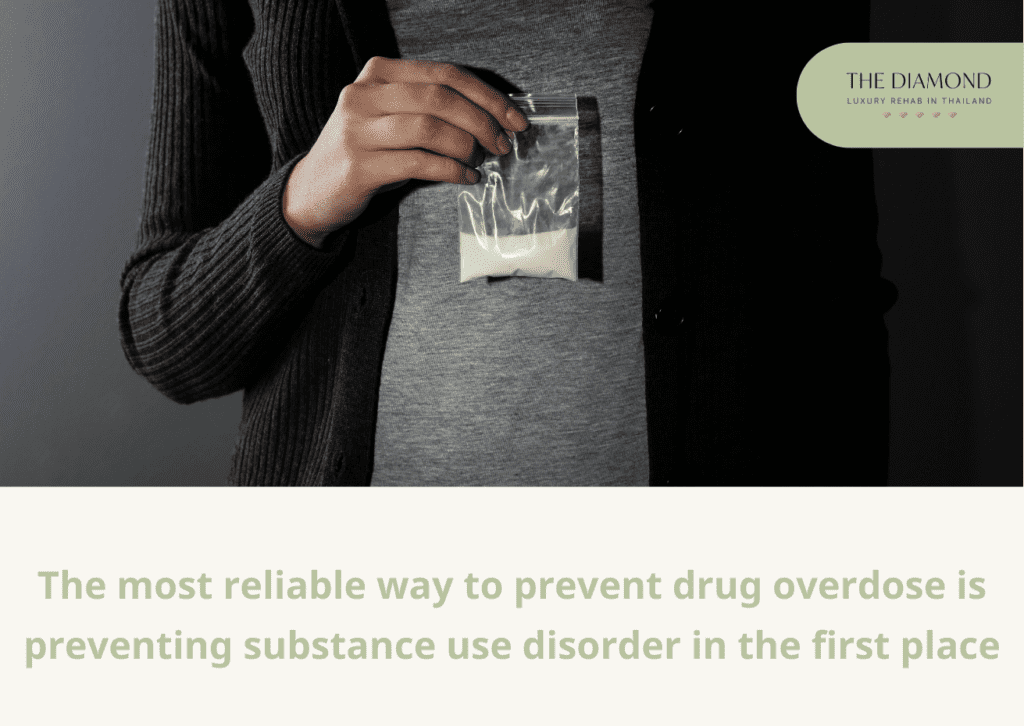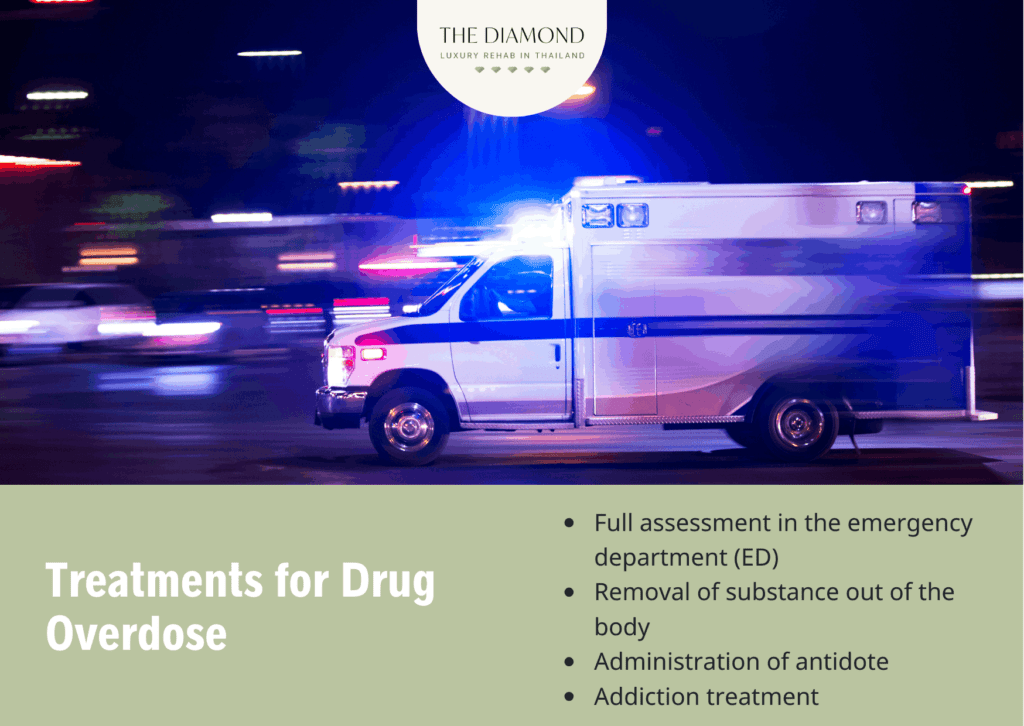Drug overdose: definition, causes, and risks

Drug overdose is a potentially dangerous complication indicated by an excessively high intake of drugs in a short period of time. The term drug overdose doesn’t just refer to cocaine, heroin, methamphetamine, and similar substances. It is possible for people to overdose on alcohol and prescription opioids as well.
The cause of drug overdose, whether intentional or accidental, is overstimulation of the brain and body. As a person takes too much of the drug, their brain and body go into overdrive, which causes a wide range of overdose symptoms. The specific mechanisms of action depend on the type of drug used.
Risks of drug abuse include mixing drugs, low tolerance, dropping out of treatment, not knowing enough about the drug, having mental health problems, and method of use.
What is drug overdose?
Drug overdose is the intake of a drug in amounts much higher than recommended, within a short timeframe. It is possible for a person to overdose on a wide range of drugs from prescription opioids to illicit drugs, alcohol, and other potent or addictive substances.
When discussing “what is overdose,” it’s important to mention people overdose on herbal medicines too, not just prescription medications.
Drug overdose is either accidental or intentional. Accidental drug overdose happens when a person takes the wrong substance or a combination of substances at the wrong time or in the wrong amount, without being aware of it. This additionally applies to people who take drugs to achieve a “high” effect but don’t know how potent they are.
An intentional overdose happens when a person takes too much of a drug (or more of them) too quickly and on purpose. They want to inflict self-harm and choose drugs as a method to make it happen.
Overdose is fatal or non-fatal. Not all cases of drug overdose lead to death, but they have dangerous effects and consequences.
How common is drug overdose?
Drug overdose is common, as the National Institute on Drug Abuse published a 2023 report titled, “Drug Overdose Death Rates,” which stated that in 2021, approximately 106,000 Americans lost their lives to drug-related overdoses, which included both illegal drugs and prescription opioids.
Men are more likely to overdose than women. The same report showed the prevalence of drug-related overdose among men was 69%. That means that 31% of drug overdose deaths account for women.
Drug overdose happens in people of all ages. A 2021 study by Kelly et al., published in the journal Pediatric Research found that between 1999 and 2018, the number of children under the age of 12 who died as a result of drug overdoses exceeded one thousand. Opioid overdoses constituted an average of half of pediatric overdose fatalities from 1999 to 2007.
When it comes to adolescents, drug overdose cases are on the rise. A study by Friedman et al., published in the April 2022 issue of JAMA Network found that in 2010, there were 518 drug-related deaths involving adolescents, but that number jumped to 954 in 2020.
Finally, in the elderly population, 55 years and older, drug overdose cases aren’t uncommon. In 1999, there were 518 drug overdose deaths in this age group, whereas that number in 2019 increased to 10,292, as per a 2022 study by Mason et al., published in JAMA Network Open.
What causes drug overdose?

Drug overdose is caused by a rapid and excessively high intake of one or more drugs whose effects overwhelm the brain and body. The mechanism of action that leads to the development of overdose varies from one type of drug to another.
For example, alcohol is absorbed through the proximal gastrointestinal (GI) tract and primarily metabolized in the liver. The main site of action of acute alcohol poisoning, or alcohol overdose, is the central nervous system (CNS). In the central nervous system, alcohol elevates CNS inhibition and reduces excitation.
The primary inhibitory neurotransmitter in CNS is gamma-aminobutyric acid (GABA), which binds to receptors enabling chloride to enter the cell. As a result, cellular excitability weakens. As alcohol binds to GABA strongly, it activates an inhibitory cascade, which leads to problems such as impaired coordination, sedation, and cognitive dysfunction. In other words, drinking too much too quickly overstimulates GABA pathways and induces symptoms of alcohol poisoning or overdose.
When it comes to cocaine, a 2008 paper by Heard et al., from The Open Pharmacology Journal reported that at high concentrations, this drug alters pathways in the brain. At the same time, cocaine binds to sodium and potassium channels. As a result, cardiac effects of overdose occur. Both the brain and body become overstimulated.
An opioid overdose happens due to the excessive effect of these drugs on the brain area that regulates the respiratory rate. This results in respiratory depression and potentially leads to death.
What are the symptoms of drug overdose?

Symptoms of drug overdose are greatly determined by the substances abused. The OD symptoms are particularly severe in persons who abuse two or more substances. The most common signs and symptoms of overdose are listed below.
- Dilated or constricted pupils
- Chest pain
- Slurred speech
- Problems with balance e.g., unsteady walking
- Blue lips and/or fingers
- Difficulty breathing e.g., shallow breathing or respiratory arrest (complete cessation of breath)
- Slow or rapid heart rate
- Very low or dangerously increased body temperature
- Nausea and/or vomiting
- Gurgling sounds (a sign of blocked airways)
- Unconsciousness
- Unresponsiveness to shaking, loud noises, and painful stimuli
- Seizures, convulsions, and/or tremors
- Paranoia
- Agitation
- Hallucinations
- Aggressive behaviors
- Confusion or disorientation
- Coma
- Death
What effects does drug overdose have?
Drug overdose has physical and mental or psychological effects. The severity of the effects depends on the type of substance or substances abused as well as how the body responds to them. The most common effects of drug overdose are listed below.
- Physical effects: Besides short-term effects such as breathing and heart rate changes, vomiting, nausea, seizures, changes in body temperatures, and cardiac arrest, drug overdose has long-term effects that affect a person’s life after survival too. The most common long-term physical effects of drug overdose include toxic brain injury, liver damage, kidney damage, nerve damage, impaired cardiovascular health, long-term pain, reduced mobility, and dead limb or paralysis. At times, overdose leads to compartment syndrome, which occurs when the pressure within the muscles reaches dangerous levels. It results in the loss of parts of the body or disfigurement. Other physical effects of drug overdose include vision loss and hearing problems.
- Mental effects: Short-term psychological effects of drug overdose include confusion, disorientation, paranoia, and problems with memory. Long-term mental effects of a drug overdose lead to or aggravate major depression, anxiety, and other mental health disorders. In addition, people develop a fear of it happening again or become angry and feel betrayed by a person who supported their drug use. Additionally, a person develops persistent anger at themselves for failing to prevent overdose. There are times when people take too much too quickly with someone else. Both persons overdose and various cases are fatal. The person who survives and recovers often develops survivor guilt. Symptoms of survivor guilt include flashbacks of the traumatic event, irritability, feelings of helplessness and disconnection, and problems sleeping.
How to prevent drug overdose?

The most reliable way to prevent drug overdose is preventing substance use disorder in the first place, according to a publication titled, “Overdose Prevention Strategy” from the United States Department of Health and Human Services. Prevention strategies mainly focus on harm reduction, evidence-based treatments, and recovery support. 5 tips to prevent a drug overdose are listed below.
- Avoid mixing: Several overdoses result from combining alcohol and medications such as benzodiazepines. Both are central nervous system depressants, and combining them leads to overdose and respiratory failure. Generally speaking, it is necessary to avoid mixing alcohol with medications prescribed by a doctor.
- Watch out for fentanyl: Fentanyl is a synthetic opioid known for being 50 times more powerful than heroin. Most cases of drug overdose occur due to the unknown presence of fentanyl. It is not just added to heroin, but certain prescription pills obtained from illicit sources as well.
- Seek help early: Reach out to a family member, friend, therapist, or other healthcare professionals as soon as signs of substance use disorder or problematic use of drugs and alcohol appear. People concerned with the well-being of their friends or family members are likely to obtain favorable results from staging an intervention. Seeking help early is crucial for preventing overdose.
- Minimize the risk of relapse: Upon completing drug addiction treatment, make sure to go to support groups regularly and avoid socializing with people who abuse drugs or alcohol. This reduces the risk of relapse, which in turn leads to overdose otherwise.
- Get naloxone: Individuals at risk of opioid overdose or relapse likely want to find out which agencies have free naloxone kits available. This medication blocks the effects of opioids and restores respiratory function. That way, naloxone prevents complications associated with overdose.
What are the risks of drug overdose?

The risks of drug overdose refer to the potential dangers associated with consuming substances beyond safe or prescribed levels, leading to harmful or even fatal consequences. The biggest risks of drug overdose are listed below.
- Low tolerance: People with low tolerance to a specific drug or those experiencing a reduction in tolerance are more susceptible to overdose. This is particularly the case when the drug is potent or taken in higher amounts. A person with low tolerance to certain drugs tends to develop an overdose faster.
- Mental health problems: Mental health conditions, such as depression, increase a person’s risk of both fatal and non-fatal overdoses. Psychotic disorders and PTSD additionally make a person more likely to overdose. Mental health problems increase the risk of substance use disorders and interfere with a person’s ability to make health care decisions. They lead to engaging in unhealthy behaviors that serve as coping mechanisms. For that reason, a person keeps gradually increasing the doses they’re taking, thus putting themselves at risk of a drug overdose.
- Method of use: People who opt for intravenous routes are more susceptible to drug overdose than persons who choose other methods. Of course, this doesn’t mean other methods of use are safe. Certain drugs carry a high risk of overdose even if you don’t administer them intravenously.
- Mixing drugs: Taking multiple substances, including prescription pills, at the same time puts a person at a high risk of overdose. The same applies to combining drugs with alcohol. At times, people experiment with different substances and combinations of drugs. While it seems exciting and gives them the “high” effect, it is incredibly dangerous.
- Not knowing enough about the substance: Prescription drugs are easier to dose because their production is regulated, and doctors prescribe a specific dosage based on the patient’s needs. Yet, overdose still happens. Illicit drugs and other illegal substances are different because it’s impossible to know enough about these drugs. A specific drug gets cut and is combined with other drugs without a person being aware of it. Buying prescription pills illegally is equally dangerous because they contain other substances too. Lack of accurate knowledge about the substance puts a person at risk of overdose.
- Using alone: The risk of overdose is higher when a person is using alone, and there’s nobody to notice symptoms that say something is wrong.
- Failing to stick to the treatment: Dropping out of addiction treatment puts a person at risk of overdose. Certain people drop out due to withdrawal symptoms, whereas others feel better and assume there’s no need to stick to the end of the treatment. Regardless of the cause for dropping out of treatment, doing so paves the way to risk behaviors that result in overdose.
What are the possible treatments for drug overdose?

Possible treatments for drug overdose depend on the drug taken, the dosage, when and how the drug was taken, whether it was consumed with other substances, and the effect on the person. The success of the treatment depends on a timely response. As soon as symptoms of overdose appear, it is necessary to get urgent medical assistance, administer naloxone (if there are some), and stay with an affected individual until help arrives.
Hospital treatments for drug overdose are listed below.
- Full assessment in the emergency department (ED): This includes blood tests, psychological evaluation, and observation.
- Removal of substance out of the body: This is usually done with activated charcoal, which works by binding the drug to prevent the body from absorbing it.
- Administration of antidote (when possible): Doctors are likely to administer drugs such as naloxone to reverse the effects of an overdose.
- Admitting a patient into a hospital: Once a patient’s life isn’t in danger and treatment in the ED is completed, a patient is admitted into the hospital for further treatment. The treatment depends on the effect of overdose or complications on the body.
- Addiction treatment: Numerous patients are enrolled in addiction treatment following an overdose. The treatment for substance use disorders is tailored to the special needs of each patient. In most cases, the treatment includes detox, inpatient or residential treatment, luxury rehabs, outpatient programs, and support groups.
Is it possible to overcome drug overdose?
Yes, it is possible to overcome drug overdose. Surviving drug overdose depends on timely treatment. The most important factor in overcoming drug overdose and achieving recovery is getting the necessary treatment without delays.
Recovery duration depends on the effects of the overdose on the body i.e., the extent of organ damage. Numerous nonfatal overdoses occur for every fatal one, and each one takes a personal and monetary toll, according to an article titled, “Understanding Drug Overdoses and Deaths” last reviewed in May 2023 by the Centers for Disease Control and Prevention
Self-care after treatment plays an important role in overcoming drug overdose. That means a patient must adhere to all doctor’s instructions and make necessary lifestyle adjustments. A healthy lifestyle is incredibly important to both physical and mental health.
Major support for overcoming drug overdose and addiction comes from therapy sessions. Therapy is integrated into inpatient and outpatient treatment programs. The exact type of therapy varies, but in most cases, patients receive cognitive-behavioral therapy (CBT), individual counseling, group counseling, and medication-assisted treatment (MAT).
The role of therapy is to help a patient focus on identifying irrational or dysfunctional thoughts that lead to negative emotions and dangerous behaviors. Once these thoughts are identified, patients learn skills to change them into functional, more positive alternatives that lead to positive emotions and healthy behaviors. Overcoming drug abuse appears to be challenging and lengthy, but with a strong support system and proper treatment, it is highly likely for a patient to improve their quality of life.

